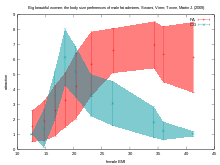Fat fetishism
Fat fetishism is sexual attraction to overweight or obese people due to their weight and size.[1][2]
A variety of fat fetishism is feed(er)ism or gaining, where sexual gratification is obtained not from the fat itself but from the process of gaining, or helping others gain, body fat.[3] Fat fetishism also incorporates stuffing and padding, whereas the focus of arousal is on the sensations and properties of a real or simulated gain.
Attraction
A 2009 study found that heterosexual male fat admirers preferred females that were clinically overweight and rated both overweight and obese women more positively than slighter individuals. The study also found that participants reacted positively to a much wider range of figures than a control group, even rating emaciated figures higher. It concludes "these findings suggest that an explanation for fat admiration may be that FAs are rejecting sociocultural norms of attractiveness".[4]
Feederism
Gainers and feedees are people who enjoy the fantasy or reality of gaining weight themselves. Encouragers and feeders enjoy the fantasy of helping someone else gain weight. Gainer and encourager are common labels among gay men, while both straight men and women as well as lesbian women often identify as feeders and feedees.[5] Some prefer the term feedism over feederism, because feederism suggests that the feeder is dominant and that the feedee is the recipient of another person's wishes, whereas feedism suggests a more equal relationship between the feeder and feedee.[3]
While gaining and feeding are often considered fetishes, many within the gainer and feederism communities report viewing them more as a lifestyle, identity or sexual orientation.[5]
Portrayal in the media
Feederism is portrayed by media as a taboo or a niche interest.[3]:92 The portrayal is mostly negative, due to people such as Donna Simpson and movies like Feed, which is an example of non-consensual feederism. Research has shown that the overwhelming majority of feederism relationships are fully consensual and immobility is mostly kept as a fantasy for participants.[3]
History
The gay gainer community grew out of the Girth & Mirth movement in the 70s. By 1988 there were gainer-specific newsletters and in 1992, the first gainer event, called EncourageCon, was held in New Hope, Pennsylvania. In 1996, GainRWeb launched, the first website dedicated to gay men into weight gain, ushering in the internet era.[6]
See also
- Bear (gay culture)
- Big Beautiful Woman
- Big Handsome Man
- Chub (gay culture)
- Hogging (sexual practice)
- Leblouh
References
- Merkin, Daphne (22 August 2010). "The F Word". The New York Times.
- Griffiths, Mark D. (30 June 2015). "The Fat Fetish, Explained". Psychology Today.
- Charles, Kathy (17 September 2015). Feederism : eating, weight gain, and sexual pleasure. Palkowski, Michael. [Basingstoke]. pp. 6, 51, 84. ISBN 978-1-137-47046-1. OCLC 914318290.
- Swami, V.; Tovée, M. J. (2009). "Big Beautiful Women: The Body Size Preferences of Male Fat Admirers". Journal of Sex Research. 46 (1): 89–96. CiteSeerX 10.1.1.614.550. doi:10.1080/00224490802645302. PMID 19116865.
- Bestard, Alyshia (September 2008). "Feederism: an exploratory study into the stigma of erotic weight gain". University of Waterloo Thesis Paper: 27–28. OCLC 650872028.
- Textor, Alex Robertson (July 1999). "Organization, Specialization, and Desires in the Big Men's Movement: Preliminary Research in the Study of Subculture-Formation" (PDF). International Journal of Sexuality and Gender Studies. 4 (3): 218–220. doi:10.1023/A:1023223013536. hdl:2027.42/44662.
Sources
- Giovanelli, Dina and Natalie Peluso. 2006. "Feederism: a new sexual pleasure and subculture". Pp 309–314 in The Handbook of New Sexuality Studies. Edited by Steven Seidman. Oxford, UK: Routledge.
- Kathleen LeBesco. 2004. Revolting Bodies?: The Struggle to Redefine Fat Identity. Univ of Massachusetts Press. ISBN 1-55849-429-4
- Don Kulick and Anne Meneley. 2005. Fat: The Anthropology of an Obsession. ISBN 1-58542-386-6
External links
- Pardes, Arielle (19 March 2015). "The Women Who Get Off by Watching Men Gain Weight - VICE". www.vice.com.
